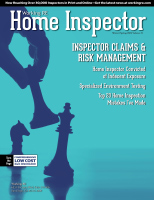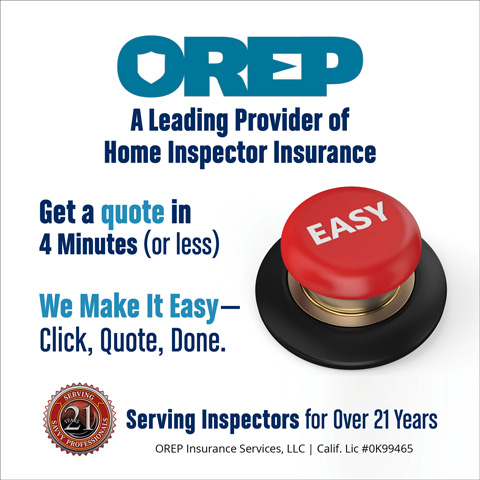 | > E&O/GL Insurance for Home Inspectors Competitive Rates, Broad Coverage, Free Risk Management, online inspection support for tough questions, discounts on education and more… Professional Coverage, Competitive Pricing Shop OREP today! |
Managing Client Expectations
By Kendra Budd, Editor
There are a lot of misconceptions on exactly what a home inspection entails—often frustrating a home inspector’s clients. Over the years, the myth that a home inspector can and will find every and any problem in a home has become increasingly harder to subdue. This leads to trouble later down the road, once a client feels as if they have been “cheated” by their inspector.
We’ve talked about in the past how your pre-inspection agreement will be your best line of defense when it comes to potential illegal allegations (search for Pre-Inspection Agreements on WorkingRE.com). However, what if you could avoid a client’s anger before the inspection even begins?
Learning how to manage a client’s expectations before and even during the home inspection could save yourself a headache later down the road. Many people tend to oversell their capabilities in order to grow their business, but as a home inspector that is possibly the worst thing you could do. From your website, to your communication skills, to walking through the pre-inspection agreement with your client—these can all have an impact on your customer satisfaction.
Here’s some best practices on managing client expectations.
Never Oversell
The biggest problem home inspectors may face, is overselling their business. Much of this comes from advertisements and websites. Obviously, you want your business and services to stand out above the rest, but you never want to be dishonest. We’re not saying that you should by any means undersell your business, but you can make your business sound better than others without overselling either. You want to find a way to market your services in a way that is both appealing and honest to potential clients.
The reason you never want to oversell is because you don’t want a client to turn around and sue you later down the line because you exaggerated your services. An example of this could be using the cringe-worthy slogan “we can see through walls with infrared technology.” Most home inspectors would never dare to even think about saying something like this, but there are other inspectors who do.
Let’s say that same inspector gets sued months later because they weren’t able to see mold growing in the walls—and now their client’s house is infested. Even if this inspector had a pre-inspection agreement outlining this was part of their excluded services, the client could argue that through their website, advertising, and communication, they were being dishonest. Who would dare say they can see through walls if they actually can’t? A slogan like this could spell out big trouble later on.
So, how do you properly sell your business to a potential client? Answer questions, be honest, and always bring it back to the positives. If a client asks you about a specific service, and you don’t provide that service, don’t be afraid to be upfront about that fact. Don’t twist words around to make it sound like you do. Before you think you’ve lost a client, take a breath and bring it back around to a service that you do provide.
This can look like: “I’m sorry. Unfortunately, we don’t offer X service, but we do offer a Y service.” This is a sales tactic that is used everywhere, even in department stores. This allows you to be honest with your client, while still maneuvering them to the reasons why they should hire you, instead of the other guy.
This tactic allows you to sell your services ethically and honestly, without facing future repercussions. By accurately selling your business without under or overselling it, you will be guaranteed to see less client complaints and more customer satisfaction. Which in turn will grow your business and reputation.
(story continues below)
(story continues)
The Pre-Inspection Talk
Now comes the pre-inspection talk, also known as the driveway talk. You want to have this conversation with your client before you step into the house. This is when you’re going to want to go over the pre-inspection agreement in great detail, answer any more questions, and reiterate what your inspection and walkthrough will entail.
First and foremost, don’t show up on time…show up early. Showing up just five minutes early will make you look efficient and reliable—which could give you a leg up on getting recommended more. Once you’ve arrived, go over the most imperative parts of your pre-inspection agreement again. How many times have you been told to read and accept the terms and services on a website? Have you actually read through it all the way? More than likely, you skimmed it. The same can be said about pre-inspection agreements. Make sure your client has a full understanding of exactly what they signed. Otherwise, they could argue that your clauses were misleading. By verbally going over this, you can ensure they fully comprehend the agreement.
When you are going over this information, keep a nice even pace—don’t rush your client. Look up often to be sure they are listening and taking in the information correctly. Allow time in between each clause for your client to ask any questions they may have; this way they don’t forget any of their questions. Also, you want to make sure when explaining the clause that you’re not talking as a home inspector. You want to communicate in terms that your client will easily understand.
Finally, once you have fully gone over the pre-inspection agreement, and you feel confident that your client has a clear grasp of it, you’ll want to explain the inspection in detail. Let them know what spaces you’re searching and what you’re looking for in each one. Most importantly let them know the why. When a home inspector walks into a person’s home, the truth is the client usually has a vague understanding of what you’re doing and why you’re doing it.
Explaining your process in detail, in an easy to digest kind of way, will allow the client to not only comprehend the services you provide but also ease their anxiety as well. Let’s be honest, it’s awkward when a stranger comes into your home to provide a service, and you’re not exactly sure what that service entails, which is why it’s also good to be forthcoming even during the inspection.
During the Inspection
Let’s face it, people are nosey and they’re going to want to know what you’re doing during your inspection. Many inspectors find this to be a nuisance or even a safety hazard, which is why it’s best to work with your client, rather than against them.
Let your client know that you will need at least an X amount of distance—whatever you deem is necessary. However, you never want to tell a client you need full and complete space during the inspection. This is actually a great opportunity for you to explain to your client what is going on during the inspection, this way they better understand their report later down the line.
Think about it this way: when you go to the dentist, your dentist knows you’re more than likely nervous to some degree. This is why dentists tend to talk through the procedure, and even ask you questions, no matter how annoying you may find it. This is to lessen your anxiety; the same method could be used during your home inspection.
Not to mention, it actually could be very beneficial to have your client with you during the inspection because they might know about a problem that you can’t find or see. Many times, clients second guess themselves, and if you don’t find an issue in your report that they suspected was going on, they might just forget about it altogether. Asking your client if they have any specific concerns in their home should be the first task. So long as it’s in your scope of work, it will be beneficial to your rapport with a client to get this solved first. This will also allow your inspection to go faster.
So long as your client understands the safety measures needed to complete a home inspection, there should be no problem allowing your client to accompany you, ask questions, and point out concerns.
Final Thoughts
We’ve all heard it before, “the customer is always right!” Well that simply isn’t a true statement. It should be, “The expert is almost always right.” Almost, being the key word, because your clients must know that you are by no means a superhero that can see through walls.
Managing your client expectations is by no means an easy task, but with practice you’ll start to become an expert at it. Soon enough, you’ll be able to procure a script of all the need-to-know information your client needs. Most importantly, managing these expectations will protect you and your business. By preparing your client for the services you can and can’t provide, going over their pre-inspection agreement, and helping you with parts of the inspection will make it less likely for them to call back with complaints, and more likely to call back with referrals.
About the Author
Kendra Budd is the Editor of Working RE magazine and the Marketing Coordinator for OREP, a leading provider E&O insurance and General Liability policies for home inspectors—trusted by over 12,000 professionals. She graduated with a BA in Theatre and English from Western Washington University, and with an MFA in Creative Writing from Full Sail University. She is currently based in Seattle, WA.
OREP Insurance Services, LLC. Calif. License #0K99465


